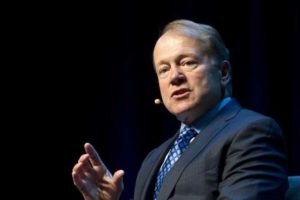 By Deborah Findling | CNBC
By Deborah Findling | CNBC
Cisco executive chairman and tech investor John Chambers believes the Trump administration and Congress will make startups great again by loosening regulations and making it easier for more companies to go public.
“You’ve got to really enable the next generation of start-ups,” Chambers told CNBC’s Josh Lipton.
“It starts with regulation, in terms of making it easier for companies to do this,” said Chambers. “It comes with, really, making America great in the startup community again.”
Startups will be pivotal to America’s future economic growth, said Chambers. Though 90 companies that went public on the Nasdaq last year, he stressed that we need three to five times this number going forward.
Chambers is actively involved in the Silicon Valley startup scene. On Thursday, Chambers announced a new investment in voice identification and phone fraud prevention start-up Pindrop. (The details of the financing round were not disclosed.) The former Cisco CEO is also joining its board of directors, along with Andreessen Horowitz partner Martin Casado.
Chambers was first introduced to the company by Silicon Valley venture capitalist Marc Andreessen, who is becoming a Pindrop board observer. Andreessen told Chambers that if he was only going to join one more board and work with one more CEO in the world, it should be Pindrop’s Vijay Balasubramaniyan
Pindrop counts 8 of the top 10 U.S. banks among its customers and — along with Andreessen Horowitz — counts Google Capital and Citi Ventures, among its investors. It’s raised more than $120 million, according to Crunchbase.
“Voice fraud or phone fraud has become a massive, massive issue,” said Balasubramaniyan. “Organizations in the U.S. alone are losing about $10 billion in voice fraud and then they spend an additional $11.8 billion asking people all these questions.”
Currently most banks rely on questions like the callers date of birth or mother’s maiden name to identify users, said Balasubramaniyan. Pindrop, instead, uses so-called phone printing — identifying any device in the world by its sound signature, as well as a user’s voice and behavior – adding additional layers of verification.
The repatriation question
For Silicon Valley tech companies, President Trump’s first month in office has raised questions about possible regulatory changes, including lower taxes on repatriation of cash that companies currently hold outside the country.
Easing rules on repatriation could lead to a new wave of M&A in the tech industry as large companies would find it more cost-effective to use overseas cash to buy U.S. startups. Cisco, where Chambers served as CEO from 1995 until 2015, currently has almost $72 billion in cash and short-term investments on its balance sheet, the bulk of which is held overseas.
Chambers told CNBC he is in favor of change, noting the importance of an environment with a territorial tax system.
“I think we have a tax policy that was designed before Microsoft even went public,” he said. “I think we’ve got to change — we’re at a huge disadvantage around the world.”
“I think clearly the administration and Congress is going to make that happen,” Chambers added.